| The Daily Show With Jon Stewart | Mon - Thurs 11p / 10c | |||
| Conservative Libertarian | ||||
| ||||
Mar 20, 2010
Go, Jon, Go
Mar 18, 2010
Afghan Star


Regardless of the ignorant "shut up and sing" antics often charged at artists and performers bold enough to utilize their craft beyond the mental junk food modern society often views it as, music has always served the dual, often coexisting functions of both self-expression and sociopolitical discourse, a truth that comes to gripping light in the revered documentary Afghan Star. After the Taliban government was overthrown in 2001, independent television broadcasts became a cultural mainstay, while the lifted bans in Afghanistan on music, dancing and singing opened the gates for the nation's own titular American Idol imitation, something that proved to be the first experience with basic democracy for many citizens. On one hand demonstrating the uplifting possibilities of pop experience to unite a people otherwise divided by background and region (as producer and host Daoud Sediqi eloquently phrases it, he wants to replace weapons with music), Afghan Star also exhibits the ugliness that often arises from introducing modernity to regressive culture. In her final, post-ejection performance (as is customary for those voted off the show every week), the young and openly progressive female contestant Setara removes her head-wrap and dances in what would appear to most western viewers to be plain fashion, allowing her hair and her hips the freedom that Islamic law forbids, and before long, her fans have turned on her and death threats become a commonality. Director Havana Marking's observant eye attempts to straddle both social observations (what does this mean to the culture and people of Afghanistan?) and audience-friendly drama (who will win?), and while the result falls slightly further to the latter side than is preferred by this particular critic, the insights offered are aplenty and worth chewing on. For once, the McDonald's-like spreading of American culture abroad seems to have actually been a good thing.
Directed by: Havana Marking Featuring: Habib Amiri, Setara Hussainzada, Rafi Naabzada, Lima Sahar, Hameed Sakhizada, Massoud Sanjer, Daoud Sediqi, Tahir Shaqi, Fazl Had 2009, NR, 93 minutes
Mar 6, 2010
Best Pic Nom Round-Up
Presented in order of cinematic quality preference. (Don't say you weren't warned.)
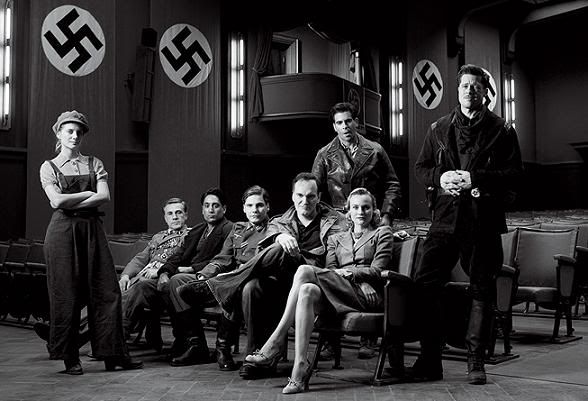
1. Inglourious Basterds
Like a madman running into a burning oil well with dynamite strapped to his back, Quentin Tarantino explores and complicates Dirty Dozen-style mythos with sneering wit, anarchic grace and poetic bombast to spare, stoking our visceral lust for revenge before undercutting it with his always-present, rarely-acknowledged emotional sincerity (embodied by a series of key asides in which the "villains" are granted a poignant, complicating dose of humanity). This is movies as language, as life, as war, as historical filters, and even as its most trashy, rollicking fun, it ain't easy. Acknowledging the complexity of such, Inglourious Basterds doesn't resolve or conclude the moral dilemmas posed by its cavalcade of historic impostors-- the questions it leaves behind are far more satisfying. The final chapter, "Revenge of the Giant Face", is a career best; as a whole, it's one of the greatest movies ever made. Full review here.
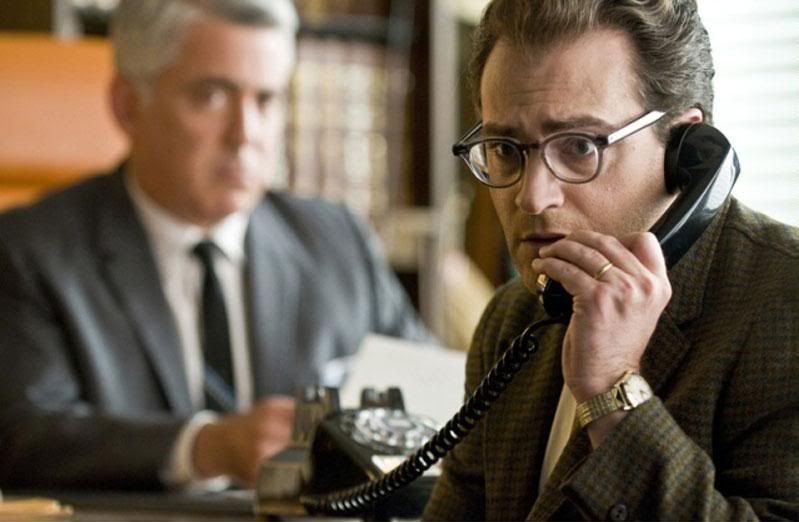
2. A Serious Man
Some consider the recent works of the Brothers Coen to be atheistic, but my experiences find it to be a trend of strict agnosticism - perpetual doubt and scrutiny, the longing for the impossible fruit of knowledge. So goes the plight of Larry Gopnik, whose existential dilemma stands to represent not only archetypal Jewish resilience, but the wearying spirit of the questioning soul, the mind that asks but cannot know. The Coen's savory comedic timing only deepens the all-penetrating mirror erected for our psyche; we laugh, so we may not cry. Full review here.

3. Up
Pixar's latest is as quintessential a work as yet created by the studio, their most deeply feeling, painterly vision to date, one that threw me on first viewing thanks to a key transitional moment (spoiler: the revelation that Charles Muntz is, in fact, a murderous scoundrel) that struck me as contrived and disingenuous. This is the downfall of much in the way of current movie criticism -- the rush to post something first, even if the thoughts being published aren't fully formed or explored, a pitfall into which I shall not stumble again -- and concerning this matter, Up was among the most enlightening experiences I had at the movies this year, which is to say nothing of the deep emotional reservoir it casts one into. Multiple viewings later, said moment still feels off to me (too structurally polished, it should have come more inconveniently out of left field), but in a vision this grand, it is one easily overlooked. A near-masterpiece. Original review - which I no longer stand by - here.
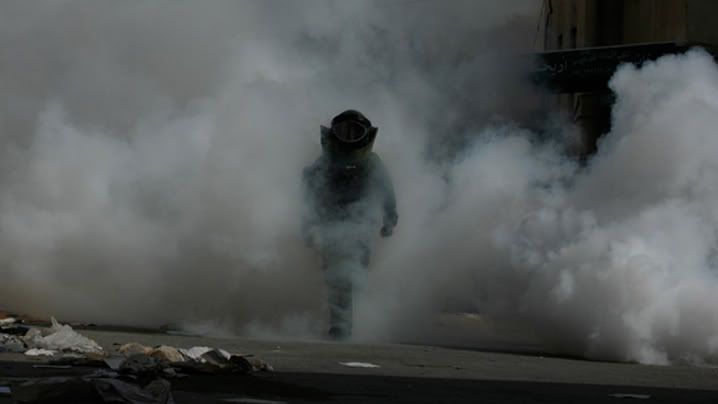
4. The Hurt Locker
When you get right down to it, the political is as personal as it gets, and no film this honest about the destructive forces of war (and the addictive nature of self-destruction) can be considered anything less than a profound humanitarian statement. Kathryn Bigelow's brilliant vision of 21st Century combat isn't about who is fighting who or whether or not Bush's war is just, but how we endure and, implicitly, how we take care of our soldiers in the face of the hellfire. It may be to the War on Terror what Apocalypse Now is to Vietnam, and it's almost as hallucinatory a vision. Original review here.
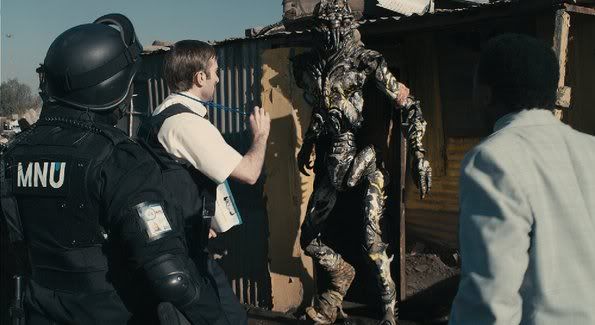
5. District 9
There's something terribly ironic about the success of District 9 in the year of The Lovely Bones (a film I've not yet seen), but more telling is the comparison between this and the year's other most celebrated sci-fi outing. James Cameron could learn a thing or ten from Neill Blomkamp's masterful use of minimal resources, and the fact that Avatar will almost surely win tomorrow night's Best Visual Effects award is indeed an injustice. I'm still sketchy on the generalities of the racial allegories at play, but this is some stunning cinematic invention at work, from the documentary-style approximation (the best since The Blair Witch Project) to the finely tuned performances (if the Academy had truly warmed up to the genre, Sharlto Copley would be amongst the Best Actor nominees) to the incredible detail work in virtually every frame. Screw Avatar - this is what people will think of when they talk about science fiction at the end of the aughts.
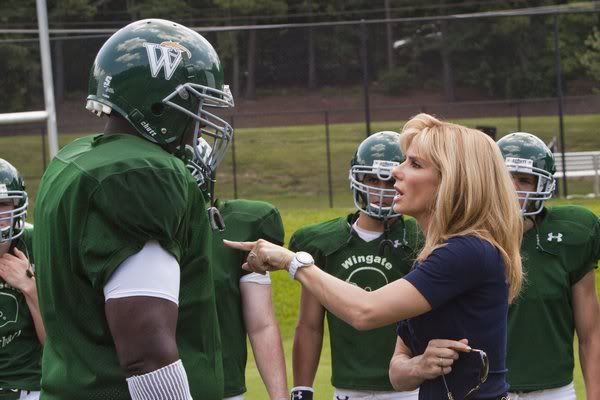
6. The Blind Side
Corny? Hell yes. Also disarmingly heartfelt, and I say that having happily had my preconceptions proven wrong, all but sneering at the advertising campaign for the film some months ago. My preferred version would lose the sitcom-esque musical accompaniment, but I suppose that such goes fittingly hand in hand with The Blind Side's broadly-pitched look at the power of selflessness in the twisted, heartless class system of capitalism. The film is obviously but expertly calculated (not my usual cup of tea by even a football field's length); Sandra Bullock's eye-opening turn cannot be denied its to-be-reckoned-with sincerity, complicating typical visions of white guilt with a powerful self-awareness of privilege and the responsibilities such incurs, while John Lee Hancock's direction is refreshingly modest in its stripped-down, everyman simplicity. The racist accusations lobbed at the film seem at best like willful misreadings, at worst insinuations that white people can't possibly want to help another "race" without disingenuous motives being at play. Onscreen or off, that hurts, but The Blind Side is nothing if not healing.
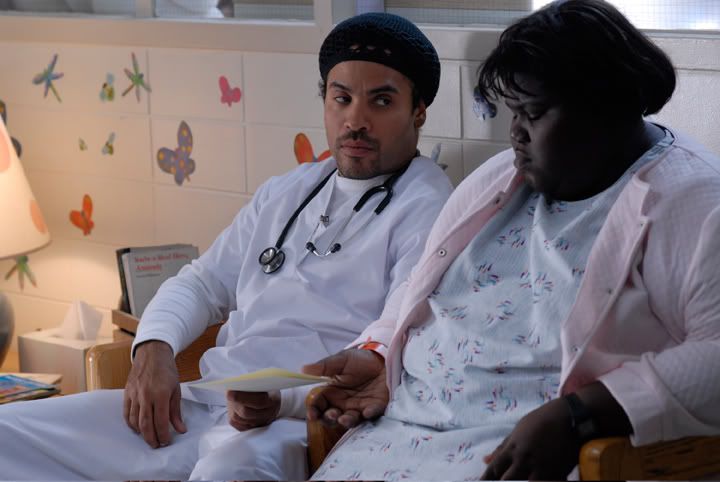
7. Precious: Based on the Novel "Push" by Sapphire
On paper, Precious doesn't bode well, but despite - or is it thanks to? - warts aplenty, it's an experience impossible to shake off or dismiss. From the rot-infested visuals to Mo'Nique's histrionic performance, Lee Daniels cranks everything up to eleven in this unflinching look at the existence of an overweight, abused black girl in 1987 Harlem, and while shrill often seems an applicable descriptor to the mayhem, the fetid insanity of it all seems appropriate given the circumstances. As the titular character, Gabourey Sidibe is a quiet marvel, particularly in the illuminating contrast provided by her hardened exterior and warm voiceovers. Take it as a given that Precious is a composite character and everything goes down more smoothly, while the oft-criticized dream sequences - overexposed fashion sequences run amok - are best seen as both an embodiment of her particular mindset as well as an appropriately damning critique of Western materialist values. Originally reviewed here.
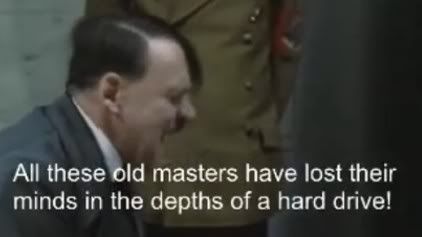
8. Avatar
James Cameron's big blue wad just might be the most disgustingly topheavy Oscar contender of all time, and I say that as a full-on admirer of Titanic since day one. On paper, this should have been the most enthralling bit of new-world escapism since Star Wars. In practice, "fun" never felt so overly calculated and laborious. Even divorced from the skullfucking nightmare that is 3D, Avatar is but the shell of a movie and only the rough framework of a rollercoaster ride, a waste of some fine acting and a emotionally vacuous, storytelling void. Pandora only represents a fully-created world if you've never bothered to explore the one you already inhabit. The narrative entry point - paraplegic soldier Jake Sully, now free to run again as a big blue cat - is lazily implemented, all but screaming impatience at elements like plot and character and pathos, but perhaps most insultingly, nor is the film's visceral quotient any good. It's all been done before and better and with less resources at that; for this Terminator enthusiast, the James Cameron I knew died a long time ago. Reviewed here and here.

9. An Education
Trite is a word that regularly comes to mind regarding this cautionary tale. Ditto whitewashed, simplistic, and sexless. None of these, most of all the latter, should apply when the subject matter is that of the relationship between the sweet-sixteen schoolgirl Jenny (Carry Mulligan) and the pseudo-charming sophistico David (Peter Sarsgaard), some twenty years her elder. Excellent performances (as the romantically inclined schoolgirl, Mulligan is a revelation of yearning and nuance in a performance ten times more complex than the film that flaunts it) and technical competence can't begin to counter the infuriating manner in which this adaptation of Lynn Barber’s memoir sweeps the dirty details of its subject matter under the carpet, squashing it into gutless, feel-good tripe. Jenny's trials can't possibly begin to prepare her for the real world because An Education does not take place in/refuses to acknowledge it.

10. Up in the Air
Like a contracted virus, Up in the Air didn't sour me so much at first contact as it did in the days and weeks thereafter, as its sickening gloss and trivializing attitude towards our current employment crisis sank in like a corrosive STD. I don't know what's worse: the have-its-cake-and-eats-it-too writing (screenplay seminar-quality tactics posing as legitimate social commentary) or the trashy manner in which real employees being laid off stands as the foundation (both literally and figuratively) for a faux character study in which a greedy scoundrel gets an out-of-jail-free card for legitimate self-awakening. Juno, for all its annoyances, won me over on the basis of excellent characterizations and empathetic performances; Up in the Air is well-polished bullshit at best, manifest of nothing less than everything wrong with America today (with the singular exception of Vera Farmiga's glorious, necktie-adorned ass). Original review here.

1. Inglourious Basterds
Like a madman running into a burning oil well with dynamite strapped to his back, Quentin Tarantino explores and complicates Dirty Dozen-style mythos with sneering wit, anarchic grace and poetic bombast to spare, stoking our visceral lust for revenge before undercutting it with his always-present, rarely-acknowledged emotional sincerity (embodied by a series of key asides in which the "villains" are granted a poignant, complicating dose of humanity). This is movies as language, as life, as war, as historical filters, and even as its most trashy, rollicking fun, it ain't easy. Acknowledging the complexity of such, Inglourious Basterds doesn't resolve or conclude the moral dilemmas posed by its cavalcade of historic impostors-- the questions it leaves behind are far more satisfying. The final chapter, "Revenge of the Giant Face", is a career best; as a whole, it's one of the greatest movies ever made. Full review here.

2. A Serious Man
Some consider the recent works of the Brothers Coen to be atheistic, but my experiences find it to be a trend of strict agnosticism - perpetual doubt and scrutiny, the longing for the impossible fruit of knowledge. So goes the plight of Larry Gopnik, whose existential dilemma stands to represent not only archetypal Jewish resilience, but the wearying spirit of the questioning soul, the mind that asks but cannot know. The Coen's savory comedic timing only deepens the all-penetrating mirror erected for our psyche; we laugh, so we may not cry. Full review here.

3. Up
Pixar's latest is as quintessential a work as yet created by the studio, their most deeply feeling, painterly vision to date, one that threw me on first viewing thanks to a key transitional moment (spoiler: the revelation that Charles Muntz is, in fact, a murderous scoundrel) that struck me as contrived and disingenuous. This is the downfall of much in the way of current movie criticism -- the rush to post something first, even if the thoughts being published aren't fully formed or explored, a pitfall into which I shall not stumble again -- and concerning this matter, Up was among the most enlightening experiences I had at the movies this year, which is to say nothing of the deep emotional reservoir it casts one into. Multiple viewings later, said moment still feels off to me (too structurally polished, it should have come more inconveniently out of left field), but in a vision this grand, it is one easily overlooked. A near-masterpiece. Original review - which I no longer stand by - here.

4. The Hurt Locker
When you get right down to it, the political is as personal as it gets, and no film this honest about the destructive forces of war (and the addictive nature of self-destruction) can be considered anything less than a profound humanitarian statement. Kathryn Bigelow's brilliant vision of 21st Century combat isn't about who is fighting who or whether or not Bush's war is just, but how we endure and, implicitly, how we take care of our soldiers in the face of the hellfire. It may be to the War on Terror what Apocalypse Now is to Vietnam, and it's almost as hallucinatory a vision. Original review here.

5. District 9
There's something terribly ironic about the success of District 9 in the year of The Lovely Bones (a film I've not yet seen), but more telling is the comparison between this and the year's other most celebrated sci-fi outing. James Cameron could learn a thing or ten from Neill Blomkamp's masterful use of minimal resources, and the fact that Avatar will almost surely win tomorrow night's Best Visual Effects award is indeed an injustice. I'm still sketchy on the generalities of the racial allegories at play, but this is some stunning cinematic invention at work, from the documentary-style approximation (the best since The Blair Witch Project) to the finely tuned performances (if the Academy had truly warmed up to the genre, Sharlto Copley would be amongst the Best Actor nominees) to the incredible detail work in virtually every frame. Screw Avatar - this is what people will think of when they talk about science fiction at the end of the aughts.

6. The Blind Side
Corny? Hell yes. Also disarmingly heartfelt, and I say that having happily had my preconceptions proven wrong, all but sneering at the advertising campaign for the film some months ago. My preferred version would lose the sitcom-esque musical accompaniment, but I suppose that such goes fittingly hand in hand with The Blind Side's broadly-pitched look at the power of selflessness in the twisted, heartless class system of capitalism. The film is obviously but expertly calculated (not my usual cup of tea by even a football field's length); Sandra Bullock's eye-opening turn cannot be denied its to-be-reckoned-with sincerity, complicating typical visions of white guilt with a powerful self-awareness of privilege and the responsibilities such incurs, while John Lee Hancock's direction is refreshingly modest in its stripped-down, everyman simplicity. The racist accusations lobbed at the film seem at best like willful misreadings, at worst insinuations that white people can't possibly want to help another "race" without disingenuous motives being at play. Onscreen or off, that hurts, but The Blind Side is nothing if not healing.

7. Precious: Based on the Novel "Push" by Sapphire
On paper, Precious doesn't bode well, but despite - or is it thanks to? - warts aplenty, it's an experience impossible to shake off or dismiss. From the rot-infested visuals to Mo'Nique's histrionic performance, Lee Daniels cranks everything up to eleven in this unflinching look at the existence of an overweight, abused black girl in 1987 Harlem, and while shrill often seems an applicable descriptor to the mayhem, the fetid insanity of it all seems appropriate given the circumstances. As the titular character, Gabourey Sidibe is a quiet marvel, particularly in the illuminating contrast provided by her hardened exterior and warm voiceovers. Take it as a given that Precious is a composite character and everything goes down more smoothly, while the oft-criticized dream sequences - overexposed fashion sequences run amok - are best seen as both an embodiment of her particular mindset as well as an appropriately damning critique of Western materialist values. Originally reviewed here.
8. Avatar
James Cameron's big blue wad just might be the most disgustingly topheavy Oscar contender of all time, and I say that as a full-on admirer of Titanic since day one. On paper, this should have been the most enthralling bit of new-world escapism since Star Wars. In practice, "fun" never felt so overly calculated and laborious. Even divorced from the skullfucking nightmare that is 3D, Avatar is but the shell of a movie and only the rough framework of a rollercoaster ride, a waste of some fine acting and a emotionally vacuous, storytelling void. Pandora only represents a fully-created world if you've never bothered to explore the one you already inhabit. The narrative entry point - paraplegic soldier Jake Sully, now free to run again as a big blue cat - is lazily implemented, all but screaming impatience at elements like plot and character and pathos, but perhaps most insultingly, nor is the film's visceral quotient any good. It's all been done before and better and with less resources at that; for this Terminator enthusiast, the James Cameron I knew died a long time ago. Reviewed here and here.

9. An Education
Trite is a word that regularly comes to mind regarding this cautionary tale. Ditto whitewashed, simplistic, and sexless. None of these, most of all the latter, should apply when the subject matter is that of the relationship between the sweet-sixteen schoolgirl Jenny (Carry Mulligan) and the pseudo-charming sophistico David (Peter Sarsgaard), some twenty years her elder. Excellent performances (as the romantically inclined schoolgirl, Mulligan is a revelation of yearning and nuance in a performance ten times more complex than the film that flaunts it) and technical competence can't begin to counter the infuriating manner in which this adaptation of Lynn Barber’s memoir sweeps the dirty details of its subject matter under the carpet, squashing it into gutless, feel-good tripe. Jenny's trials can't possibly begin to prepare her for the real world because An Education does not take place in/refuses to acknowledge it.

10. Up in the Air
Like a contracted virus, Up in the Air didn't sour me so much at first contact as it did in the days and weeks thereafter, as its sickening gloss and trivializing attitude towards our current employment crisis sank in like a corrosive STD. I don't know what's worse: the have-its-cake-and-eats-it-too writing (screenplay seminar-quality tactics posing as legitimate social commentary) or the trashy manner in which real employees being laid off stands as the foundation (both literally and figuratively) for a faux character study in which a greedy scoundrel gets an out-of-jail-free card for legitimate self-awakening. Juno, for all its annoyances, won me over on the basis of excellent characterizations and empathetic performances; Up in the Air is well-polished bullshit at best, manifest of nothing less than everything wrong with America today (with the singular exception of Vera Farmiga's glorious, necktie-adorned ass). Original review here.
Mar 4, 2010
2012 (2009): F
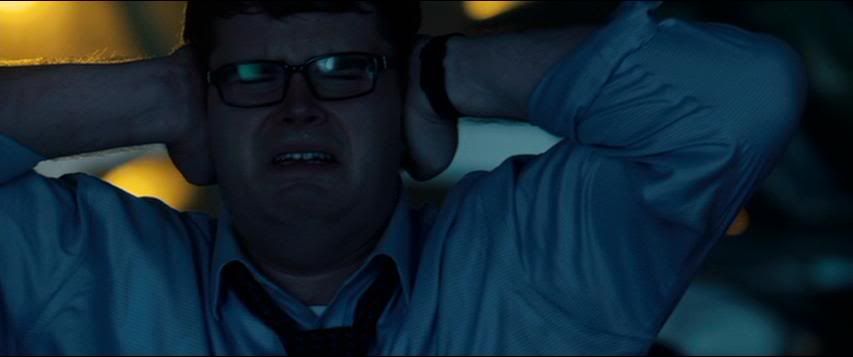
The end of the world seems a comparably desirable affair in the wake of the disaster that is Roland Emmerich's 2012, a work that at once replicates virtually every film previously made by the ultra-hack director and takes his fetishistic obsession with mass destruction to hysterical new levels. From the hateful Independence Day to the trashy Godzilla to the sheer embarrassment that was 10,000 BC, he's never made a remotely good bit of entertainment and 2012 just might be his Plan 9 From Outer Space, sans the aching artistic aspirations that lovingly framed the ineptitude of Ed Wood's productions. Where to begin? Less an actual narrative film than a feature-length special effects reel with enough celebrity cameos to simulate the ghost of a plot (best is Woody Harrelson, the only person on board who seems to recognize the sheer stupidity of it all, hamming it up to 11, and beyond), 2012 might be the most exploitative disaster movie ever made, a work in which obligatory human drama - disingenuously meant to justify the proceedings beyond the anti-life rah-rah of its dispassionate eye for destruction - serves little legitimate purpose beyond stretching things out to heretofore unbearable lengths. Berlin Alexanderplatz feels like a Saturday afternoon matinee compared to this.
The Earth, lambasted by damaging particles from the sun, is undergoing some major changes, and California sinking into the Pacific is just the beginning. The work of Emmerich's special effects crew is nifty indeed, but for all the ridiculous details and needle-threading thrown in to this cynical end of days (damn near half the movie is dedicated to narrowing gaps and countdowns), nothing here comes even remotely close to the duel awe/terror conjured by Steven Spielberg's great, underappreciated War of the Worlds. Even the isolated few characters we're supposed to feel for (thanks to Harald Kloser and Thomas Wander's maudlin score) are treated dispassionately, framed less like people than like pawns ready to be tossed aside at a moment's notice, necessary only for the risible final hour in which the lucky few not incinerated, drowned, or otherwise consumed by the quakes of the Earth board a series of Arks constructed in the Himalayas for the very purpose of ensuring the survival of the human race through this long-foreseen disaster. In a film that manages to outstay its welcome even before getting around to the title card, it's an epically drawn-out sequence enough to make one envious of the masses to have already met their maker.
Subscribe to:
Posts (Atom)
